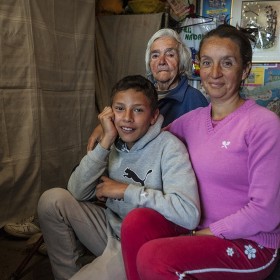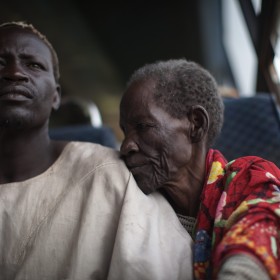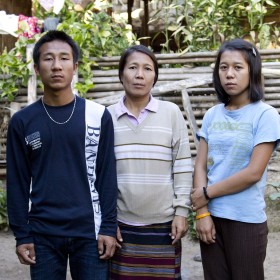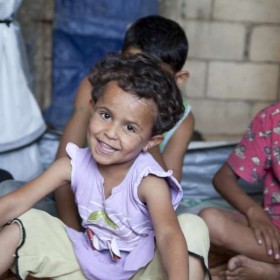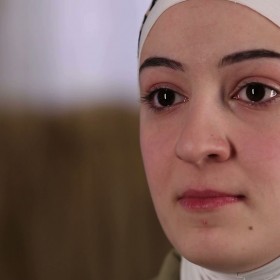Peter’s Story, Kenya
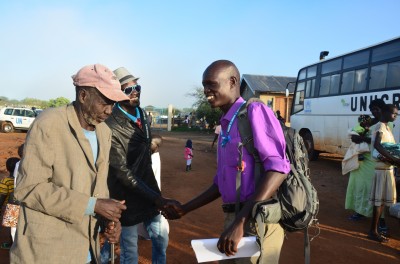
Peter visiting Ethiopian refugees who were returning home. Photo by T. Ongaro/2014
I bade my wife, Nyabile, and infant son farewell on 10 December, and left them in the care of my nephew and niece, both university students. I was due to return in one week.I had joined UNHCR as a protection associate in Bor, capital of Jonglei state, less than three months before. Shortly thereafter, Nyabile and I were blessed with the birth of our first child, Dinai. Life was good.
I flew to Ayod some 200km north of Bor to conduct training in prevention and response to gender-based violence. Before joining UNHCR, I had worked with an NGO as protection coordinator. I handled numerous cases involving female survivors of rape. I would put myself in their shoes and reassure them it was not their fault, that they should not feel guilty. I would take them to hospital for treatment to prevent pregnancy as well as infection through HIV and sexually transmitted diseases. As a graduate of law at John Garang Memorial University in Bor, my main concern was that survivors should receive justice. For this we brought cases to the national police.

Peter visiting Ethiopian refugees who were returning home. Photo by T. Ongaro/2014
My mission to Ayod went ahead as planned. I trained Government and NGO medical personnel to deal with survivors of rape and other forms of violence. I taught members of the Ayod County Youth Association and women’s groups to support survivors and encouraged them to report incidents and seek help.I was still in Ayod when clashes erupted in Juba on 15 December. Full scale combat had flared up among the ranks of our country’s military. I received the alarming news by telephone. On 17 December, the day I was to have returned, similar clashes erupted in Bor with unimaginable ferocity. I was afraid. No-one was safe. I knew civilians had sought refuge at the UN Base in Juba. I telephoned Nyabile and told her to leave everything and move to the UN Base in Bor. It was the only hope for my family.I was stranded in Ayod. UN aircraft were prohibited from flying. UN Rules forbade me to travel by road. It was too risky. The war was spreading. I only had my mobile phone and my laptop to connect me with the outside world. At the NGO compound where I was staying solar technology ensured electricity at all times, and fortunately the mobile network functioned.
Two weeks later with the assistance of my UNHCR colleagues in Bor and Juba, Nyabile was evacuated by air from Bor with our son, my niece and other dependents of UN staff. My nephew had to stay behind; it was too dangerous for an adult male to leave the UN Base in Bor. I was desperate for my family to leave the country. The security situation was worsening. The war’s tribal character was now undeniable. Youth had joined the fray. The UN Base in Juba where my family had moved was overcrowded. Conditions were filthy and inappropriate for the baby. Friends and colleagues came to the rescue and collected $300 to rent a vehicle to take my family to Nadapal, on South Sudan’s border with Kenya.They left Juba on 31 December. Except for the driver and Dinai, all the passengers were women. I telephoned at short intervals, monitoring their progress. Then I lost contact with Nyabile. Fear gripped me. I imagined the worst. I tried not to think of the many survivors of rape that I had dealt with in my work. For nine agonizing hours, I prayed as I dialed and redialed my phone.
The call finally went through at 2am. “Are you alive?” is how I greeted my wife. They were unharmed. Armed men had stopped them as darkness was falling, searched the vehicle and ordered them to stay put for the night. The driver had insisted they must continue the journey. Eventually they were released at 8pm. They were in Nadapal. The next day a UNHCR colleague, Chris, telephoned me from Kakuma. He put Nyabile on the phone. I was overjoyed. My wife and baby were safe in a refugee camp in Kenya.I decided to make my way to my home area of Akobo to the east of Ayod near the border with Ethiopia. An eight day walk with total strangers lay ahead. I had no alternative. I prayed only that I would see my family again. We walked at night by the light of the full moon. At daytime, rather than risk dehydration and certain death, we rested under tree shades away from the oppressive heat. We drank water from stagnant pools. I cupped my hands and drank through my t-shirt. I prayed I would not fall sick. My parched throat hurt badly as I swallowed. I coughed blood. I wondered if I would make it.
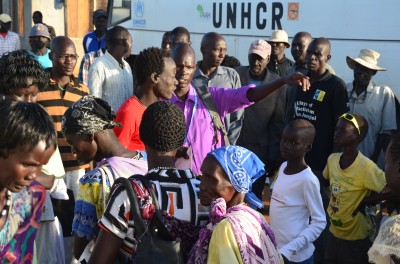
Peter visiting Ethiopian refugees who were returning home. Photo by T. Ongaro/2014
By God’s grace, I reached Akobo totally exhausted from the arduous walk. I collapsed on the floor at my cousin’s house, aching all over. I was feverish and somewhat delirious. After a day’s rest I went to an Internet café to check my email and charge my phone. There was a message from Chris. He had sent a photo of Nyabile and Dinai in Kakuma. My spirits soared and in that moment I found the strength to keep going.Later I traveled to Gambella, Addis Ababa, Nairobi, and eventually to Kakuma. My wife, my niece and I wept for joy. We had feared we would never see each other again. We wept for the tragedy that had befallen our country. I picked up Dinai. I held him close to me. I was so excited. I played with my son, my baby, thinking, “This must be God’s plan that we should meet again.”
I am forever indebted to all those who helped me during the nightmare episode that followed. They telephoned every day, and sent me messages of encouragement. They sent me credit for my phone and lent me money, trusting my word that I would repay them. My present and former colleagues as well as my kin brought my family to safety. Every step of my journey was made possible by people’s humanity. If it wasn’t for their kindness, I would have lost my mind.





